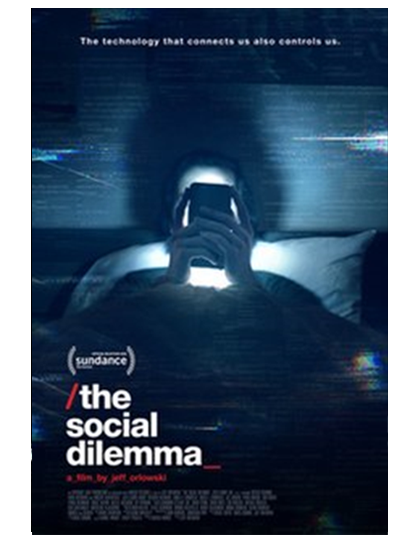The Social Dilemma

PG-13, 2020, Documentary, 1h 34m
We post, we tweet, we like, we share, we tag. Social media has connected the global village in ways unimaginable before Facebook, Instagram, Pinterest, Twitter, Google, and the many other platforms available to us. It has become an invaluable resource for many to engage social, political, economic, and religious issues. Yet, more recently, some have opted to close their social media accounts for a variety of reasons. After watching The Social Dilemma, one also may be tempted seriously to join the exodus.
The Social Dilemma is a sobering docudrama that traces the history of social media. Through a series of gripping conversations with former Silicon Valley employees and illustrations, the impact of social media is uncovered. It is a horrifying reality. Both the interviewees and dramatizations reveal that social media has been the root of much damage in our post-modern society. Indeed, it can connect us, but it also can distract, control, manipulate, and polarize us, all the while as it monetizes its users.
Social media companies engage and exploit users using surveillance capitalism, algorithmic processes, and data mining to keep us clicking and scrolling, manipulate our behavior, affect our mental health, think in a certain way, and even engender addiction, particularly among young people. The appeal of being a “free” platform quickly disintegrates when we hear classic lines like these from The Social Dilemma: “If you’re not paying for the product, then you’re the product.” “It’s the gradual, slight, imperceptible change in our own behavior and perception that is the product.” “There are only two industries that call their customers ‘users’: illegal drugs and software.”
One quickly concludes watching The Social Dilemma that there are systems in place on social media platforms with which people interact on a daily basis, which are significantly problematic. Silicon Valley essentially has designed technology to exercise control over the way social media users think, act, and live their lives. Is it any wonder that these same experts do not have social media accounts? The irony!
As Vincentians, we concern ourselves not merely with charity but with a commitment to justice. We also are keen on our key commitment to systemic change. As DePaul wrote, “The poor sometimes suffer more from lack of ‘order’ than from lack of charitable persons” (SV XIII, 423). How does a Vincentian alter the processes that sustain these manipulative and destructive social media platforms? It is hard but possible.
The producers of The Social Dilemma propose three action steps on their informative Website: share the dilemma, reboot your use, and rebuild the system. Even if we are not social media consumers, many of the people with whom we interact are. Some are parents struggling to raise their children unencumbered by the seduction of their devices and that which beckons them regularly, sometimes repeatedly. Others are families trying to build relationships at the dinner table while competing with mobile phones.
We need to get to know the truth of social media. Watching this docudrama may be a helpful start. If we are social media users, an audit of our time commitments and foci may be in order, particularly with the latter, to ensure broad exposure. Social media, as those of us who use it know, can lead to a myopia or, at worst, a tribalism fostered by the echo chambers in which we inhabit.
Finally, how do we rebuild a corrupt, self-serving system? That is a tall order, but DePaul took on daunting challenges in his day. With his convictions in God’s providence and strategic moves, Vincent took on the establishment. Some 400+ years later, Vincentians are invited to do similar with new forces that challenge human dignity, value individualism over solidarity, and seek to create a common good built on utility and not justice. It may translate into participating in “Grow the Human Tech” Movement, challenging social media platforms to #DoYourJob, and finally using not-for-profit back people first browsers like Mozilla’s Firefox.
Information on the film can be found HERE.
